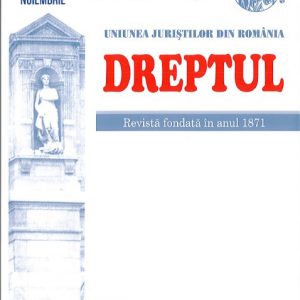-
 În ipoteza în care nu se face dovada că notificarea de reziliere a fost comunicată în condițiile prevăzute în contract nu se poate considera că a intervenit rezilierea și prin urmare operatorul de telefonie nu este îndreptățit la plata despăgubirii aferente rezilierii contractului. Este posibilă constatarea caracterului abuziv al clauzelor contractuale privind plata penalităților de întârziere și/sau a despăgubirilor datorate în caz de reziliere a contractului, însă instanța de judecată trebuie să pună în discuția contradictorie a părților respectivul aspect.
În ipoteza în care nu se face dovada că notificarea de reziliere a fost comunicată în condițiile prevăzute în contract nu se poate considera că a intervenit rezilierea și prin urmare operatorul de telefonie nu este îndreptățit la plata despăgubirii aferente rezilierii contractului. Este posibilă constatarea caracterului abuziv al clauzelor contractuale privind plata penalităților de întârziere și/sau a despăgubirilor datorate în caz de reziliere a contractului, însă instanța de judecată trebuie să pună în discuția contradictorie a părților respectivul aspect. -
 Modern society is based on the predominance of organic solidarity over mechanical solidarity and, consequently, on the predominance of the law which ensures cooperation between autonomous subjects from repressive law, which sanctions, through penalty, any deviation from the standards of the common conscience. Modern society is „civilized”, i.e. it is firstly and foremost based on „civil” law, the repressive law only being exceptional, which translates into three principles: that of the subsidiarity of criminal law, that of the necessity and legality of offences and penalties, and that of the additional protection of individual freedom when the subject is criminally charged. The consequence thereof is that, in modern liberal democracies, all repressive law is criminal, that any charge which may lead to the application of a repressive sanction is a criminal charge and that the law-maker cannot assign to the administration the competence regarding the application of repressive sanctions. Under these circumstances, the transformation of some repressive norms into norms of administrative law is a violation of the fundamental principles that structure the legal order of modern liberal states. Nonetheless, this type of practice is becoming more common. In order to ensure individual freedom, this tendency must be corrected. As politicians are not willing to do so, naturally this is a task for the judicial courts, that can rely for this endeavour on the European Court of Human Rights’ constructive jurisprudence.
Modern society is based on the predominance of organic solidarity over mechanical solidarity and, consequently, on the predominance of the law which ensures cooperation between autonomous subjects from repressive law, which sanctions, through penalty, any deviation from the standards of the common conscience. Modern society is „civilized”, i.e. it is firstly and foremost based on „civil” law, the repressive law only being exceptional, which translates into three principles: that of the subsidiarity of criminal law, that of the necessity and legality of offences and penalties, and that of the additional protection of individual freedom when the subject is criminally charged. The consequence thereof is that, in modern liberal democracies, all repressive law is criminal, that any charge which may lead to the application of a repressive sanction is a criminal charge and that the law-maker cannot assign to the administration the competence regarding the application of repressive sanctions. Under these circumstances, the transformation of some repressive norms into norms of administrative law is a violation of the fundamental principles that structure the legal order of modern liberal states. Nonetheless, this type of practice is becoming more common. In order to ensure individual freedom, this tendency must be corrected. As politicians are not willing to do so, naturally this is a task for the judicial courts, that can rely for this endeavour on the European Court of Human Rights’ constructive jurisprudence. -
 The Romanian Labour Code (Article 80) provides that, in case the dismissal was made groundlessly or unlawfully, the court will decide its cancellation and will order the employer to pay a compensation in cash. If the employee expressly requests it, in addition, the court will restore the parties to the situation prior to the issuance of the act of dismissal (therefore it will decide the reinstatement of the employee to the position held). If the employee does not request to be reinstated to the position held, the individual labour contract will cease de jure on the date when the judgment remains final. Whereas the regulation of the Labour Code in the matter (the reinstatement to the position held, if the employee so requests) is, in the author’s opinion, overly rigid, a series of de lege ferenda proposals are made in this study, in the sense of promoting a more pliable (flexible) solution, as regards the mandatory reinstatement to the position, if the employee so requests, in a given case.
The Romanian Labour Code (Article 80) provides that, in case the dismissal was made groundlessly or unlawfully, the court will decide its cancellation and will order the employer to pay a compensation in cash. If the employee expressly requests it, in addition, the court will restore the parties to the situation prior to the issuance of the act of dismissal (therefore it will decide the reinstatement of the employee to the position held). If the employee does not request to be reinstated to the position held, the individual labour contract will cease de jure on the date when the judgment remains final. Whereas the regulation of the Labour Code in the matter (the reinstatement to the position held, if the employee so requests) is, in the author’s opinion, overly rigid, a series of de lege ferenda proposals are made in this study, in the sense of promoting a more pliable (flexible) solution, as regards the mandatory reinstatement to the position, if the employee so requests, in a given case. -
 Within this study the author makes a brief examination of the main amendments and supplements of the new Civil Procedure Code, operated during the period passed from its adoption up to the present. Some of the most significant normative amendments and supplements have been operated by the Law No 310/2018 and concern the matter of material competence of judges. The author considers that by these legislative interventions the legislator’s vision about the competence of the courts of first instance has been significantly amended, this being enlarged with cases of special importance, such as those in matters of inheritance and usucapion. In this way, the courts of first instance tend to become, to a certain extent, common law courts, and not courts for the small claims. A change of substance which has been emphasized in a special way is also the one that offers another perspective on the competence of the supreme court in the matter of review. Important evolutions have also been brought in the matter of incompatibility, of the regularisation procedure and in the field of enforcement. With regard to these institutions the author has formulated also some criticism about their content, but also in relation to some unconstitutionality decisions, among which some are considered questionable.
Within this study the author makes a brief examination of the main amendments and supplements of the new Civil Procedure Code, operated during the period passed from its adoption up to the present. Some of the most significant normative amendments and supplements have been operated by the Law No 310/2018 and concern the matter of material competence of judges. The author considers that by these legislative interventions the legislator’s vision about the competence of the courts of first instance has been significantly amended, this being enlarged with cases of special importance, such as those in matters of inheritance and usucapion. In this way, the courts of first instance tend to become, to a certain extent, common law courts, and not courts for the small claims. A change of substance which has been emphasized in a special way is also the one that offers another perspective on the competence of the supreme court in the matter of review. Important evolutions have also been brought in the matter of incompatibility, of the regularisation procedure and in the field of enforcement. With regard to these institutions the author has formulated also some criticism about their content, but also in relation to some unconstitutionality decisions, among which some are considered questionable. -
 The article presents the characteristics of the civil action in criminal proceedings, points out the active and passive subjects of the legal action, and concludes that the civil liability insurer may not be obliged, in criminal proceedings, either jointly with the defendant or directly, to pay civil compensations to victims of road traffic accidents.
The article presents the characteristics of the civil action in criminal proceedings, points out the active and passive subjects of the legal action, and concludes that the civil liability insurer may not be obliged, in criminal proceedings, either jointly with the defendant or directly, to pay civil compensations to victims of road traffic accidents. -
 The statistics at national level of the disputes of administrative contentious indicate a substantial share thereof in relation to the other matters handled by the courts and reveals an increasingly „blunt” relationship of the Romanian State with its citizen. The alternative means of solving the disputes generated by the activity of the public administration, present in the Romanian legislation, prove to be insufficient to reach the purpose for which they were instituted, and the recent changes brought to the material competence of the administrative contentious courts have generated to a small extent the results pursued by the legislator. The global phenomenon that marks the public law, of progressive replacement of the unilateral character of the public action with models based on dialogue and consensus, more suitable to strengthen the democratic legitimacy and the efficiency of the relations between the administration and the citizens, requires the connection of policies in the field of judicial organization, in this case of the specialized component of administrative contentious and the doctrine of administrative law, to the global approach regarding the resolution of conflicts between the administration and the citizens, including by applying the solutions validated by the experience of other national systems.
The statistics at national level of the disputes of administrative contentious indicate a substantial share thereof in relation to the other matters handled by the courts and reveals an increasingly „blunt” relationship of the Romanian State with its citizen. The alternative means of solving the disputes generated by the activity of the public administration, present in the Romanian legislation, prove to be insufficient to reach the purpose for which they were instituted, and the recent changes brought to the material competence of the administrative contentious courts have generated to a small extent the results pursued by the legislator. The global phenomenon that marks the public law, of progressive replacement of the unilateral character of the public action with models based on dialogue and consensus, more suitable to strengthen the democratic legitimacy and the efficiency of the relations between the administration and the citizens, requires the connection of policies in the field of judicial organization, in this case of the specialized component of administrative contentious and the doctrine of administrative law, to the global approach regarding the resolution of conflicts between the administration and the citizens, including by applying the solutions validated by the experience of other national systems. -
 The article analyzes how there are settled in court, according to Chapter V of the Law No 101/2016, the disputes in matters of award of public procurement contracts, of sectoral contracts, of works concession and services concession contracts. The authors emphasise the specific features of the manner of settlement of these disputes, mentioning among them: the material jurisdiction pertains to the section of administrative disputes and fiscal matters of the tribunal, through panels specialized in public procurement, and the territorial jurisdiction pertains to the tribunal in whose district it is located the head office of the contracting authority. The case shall be settled as a matter of emergency and with priority, and filing a request for summons in matters of public procurement shall not have an enforcement suspensive effect. The first hearing shall be set 20 days after the date of registration of the complaint, and the subsequent trial terms can not be longer than 15 days, and the entire duration of the procedure can not exceed 45 days from the date of referral to the court. The judgment may be challenged by recourse, within 10 days from the communication, at the section of administrative disputes and fiscal matters of the court of appeal, which sits in a panel specialized in public procurement. According to the authors, it is justified to establish a special law for the settlement of the disputes in matters of public procurement.
The article analyzes how there are settled in court, according to Chapter V of the Law No 101/2016, the disputes in matters of award of public procurement contracts, of sectoral contracts, of works concession and services concession contracts. The authors emphasise the specific features of the manner of settlement of these disputes, mentioning among them: the material jurisdiction pertains to the section of administrative disputes and fiscal matters of the tribunal, through panels specialized in public procurement, and the territorial jurisdiction pertains to the tribunal in whose district it is located the head office of the contracting authority. The case shall be settled as a matter of emergency and with priority, and filing a request for summons in matters of public procurement shall not have an enforcement suspensive effect. The first hearing shall be set 20 days after the date of registration of the complaint, and the subsequent trial terms can not be longer than 15 days, and the entire duration of the procedure can not exceed 45 days from the date of referral to the court. The judgment may be challenged by recourse, within 10 days from the communication, at the section of administrative disputes and fiscal matters of the court of appeal, which sits in a panel specialized in public procurement. According to the authors, it is justified to establish a special law for the settlement of the disputes in matters of public procurement. -
 The article analyzes the advantages which the settlement of disputes by means of arbitration has to offer. Arbitration is an exception from the principle that administration of justice is done by the courts and represents that effective legal mechanism, designed to ensure a fair, faster and less formal, confidential trial finalized by judgments subject to enforcement. Most patrimonial and non-patrimonial causes may be settled by way of arbitration, so that this method of settlement of disputes can be chosen by parties, instead of the common law justice. The conclusion that can be drawn is that, in order to relieve the courts of their role, arbitration is a viable alternative of settlement of disputes.
The article analyzes the advantages which the settlement of disputes by means of arbitration has to offer. Arbitration is an exception from the principle that administration of justice is done by the courts and represents that effective legal mechanism, designed to ensure a fair, faster and less formal, confidential trial finalized by judgments subject to enforcement. Most patrimonial and non-patrimonial causes may be settled by way of arbitration, so that this method of settlement of disputes can be chosen by parties, instead of the common law justice. The conclusion that can be drawn is that, in order to relieve the courts of their role, arbitration is a viable alternative of settlement of disputes. -
 Medical malpractice is a subject that lately generates more and more and increasingly heated controversies. On the one hand, the patients are more and more dissatisfied with the medical services and the way they are cared for, the conditions existing in the hospital units, the quality itself of the medical act, and on the other hand, the doctors, besides the fact that they carry on their activity in poor conditions, in underfunded and understaffed hospital units, feel more and more harassed and fear that they can at any time be brought before the prosecutors as possible „criminals”. Within this article we intend to approach a quite delicate topic, namely the settlement of malpractice conflicts. Why is this a difficult problem? Why malpractice conflicts are more „delicate”? Why is it harder to solve such a conflict, as compared to a different kind of conflict? The answer is simple and widely accepted. The doctor-patient relationship is a special one. The doctorpatient relationship involves more than rights and obligations and the exercise thereof. This paper aims to draw attention and highlight the benefits of the settlement of the malpractice conflicts by using alternative methods. The results of the study can be used in the future both as a source for a possible future expansion of this study, but also as a starting point for a possible de lege ferenda amendment of the current legislation.
Medical malpractice is a subject that lately generates more and more and increasingly heated controversies. On the one hand, the patients are more and more dissatisfied with the medical services and the way they are cared for, the conditions existing in the hospital units, the quality itself of the medical act, and on the other hand, the doctors, besides the fact that they carry on their activity in poor conditions, in underfunded and understaffed hospital units, feel more and more harassed and fear that they can at any time be brought before the prosecutors as possible „criminals”. Within this article we intend to approach a quite delicate topic, namely the settlement of malpractice conflicts. Why is this a difficult problem? Why malpractice conflicts are more „delicate”? Why is it harder to solve such a conflict, as compared to a different kind of conflict? The answer is simple and widely accepted. The doctor-patient relationship is a special one. The doctorpatient relationship involves more than rights and obligations and the exercise thereof. This paper aims to draw attention and highlight the benefits of the settlement of the malpractice conflicts by using alternative methods. The results of the study can be used in the future both as a source for a possible future expansion of this study, but also as a starting point for a possible de lege ferenda amendment of the current legislation. -
 The regulation (Article 225) of the new Criminal Procedure Code is not too different from the one (Article 1491 paragraphs 3–8 and Article 150) of the previous Criminal Procedure Code (1968). Instead, the new criminal processual law does no longer provide for the possibility to settle the proposal of preventive detention, in the absence of the defendant, when the defendant is abroad, as it was stipulated in the previous Criminal Procedure Code. The authors analyze the institution of settlement of the proposal of preventive detention, by presenting some critical issues and by proposing some improvements to the new regulation.
The regulation (Article 225) of the new Criminal Procedure Code is not too different from the one (Article 1491 paragraphs 3–8 and Article 150) of the previous Criminal Procedure Code (1968). Instead, the new criminal processual law does no longer provide for the possibility to settle the proposal of preventive detention, in the absence of the defendant, when the defendant is abroad, as it was stipulated in the previous Criminal Procedure Code. The authors analyze the institution of settlement of the proposal of preventive detention, by presenting some critical issues and by proposing some improvements to the new regulation. -
 The preventive measures are institutions of criminal law of a coercive nature, by which the suspect or defendant is prevented from engaging in certain activities that would adversely affect the conduct of the criminal proceedings or the achievement of the purpose of the crimin al proceedings. The preventive measures provided in the Code of Criminal Procedure in our country are: detention, judicial control, judicial control on bail, house arrest and pre-trial detention. Of these, pre-trial detention is the measure that generates the most important problems in judicial practice. In this study, we do not intend to make an exhaustive analysis of this preventive measure or to present in detail the conditions for its disposal.
The preventive measures are institutions of criminal law of a coercive nature, by which the suspect or defendant is prevented from engaging in certain activities that would adversely affect the conduct of the criminal proceedings or the achievement of the purpose of the crimin al proceedings. The preventive measures provided in the Code of Criminal Procedure in our country are: detention, judicial control, judicial control on bail, house arrest and pre-trial detention. Of these, pre-trial detention is the measure that generates the most important problems in judicial practice. In this study, we do not intend to make an exhaustive analysis of this preventive measure or to present in detail the conditions for its disposal. -
 The aim of this study is to point out the way in which transnational spaces exert their influences on the international legal order and the national legal ones. Theorizing transnational law opens the way of such demarche. Therefore, the overview of some schools of transnational law offers the opportunity for understanding the link between transnational spaces, transnational legal orders and transnational law. The transnational spaces "Mitsubishi" and "FIFA" evolve in transnational legal orders; the latter legal orders inspire the scholars to theorize actively the transnational law itself. Such theorizing may help us to be conceptually equipped in front of future transnational spaces.
The aim of this study is to point out the way in which transnational spaces exert their influences on the international legal order and the national legal ones. Theorizing transnational law opens the way of such demarche. Therefore, the overview of some schools of transnational law offers the opportunity for understanding the link between transnational spaces, transnational legal orders and transnational law. The transnational spaces "Mitsubishi" and "FIFA" evolve in transnational legal orders; the latter legal orders inspire the scholars to theorize actively the transnational law itself. Such theorizing may help us to be conceptually equipped in front of future transnational spaces.
